Abstract
An experimental mouse intraperitoneal infection due to Escherichia coli was treated with subcutaneous amoxycillin or ampicillin. Specimens of blood and peritoneal washings from the infected animals were assayed for antibiotic concentrations and examined microscopically for observation of the effects produced by the two penicillins on the morphology of bacteria growing in vivo. Amoxycillin was significantly more effective than ampicillin in protecting the animals from the lethal effects of the infection, although the antibiotic concentrations in the body fluids were very similar for both compounds. However, microscopic examination showed marked differences in the morphological effects produced at equivalent dose levels by the two compounds against the bacteria present in blood and peritoneal fluid. Treatment with amoxycillin at dose levels that produced peak antibiotic concentrations in the body fluids ranging from one-quarter to three times the minimum inhibitory concentration resulted in the formation of spheroplast forms, which lysed rapidly. In contrast, at the same concentrations, ampicillin produced relatively stable filaments or long cell forms, which lysed much more slowly, although at higher dose levels the effects produced were generally similar to those seen with amoxycillin. It is concluded that the superior therapeutic activity of amoxycillin compared with ampicillin is due to its greater bacteriolytic activity in vivo.
Full text
PDF
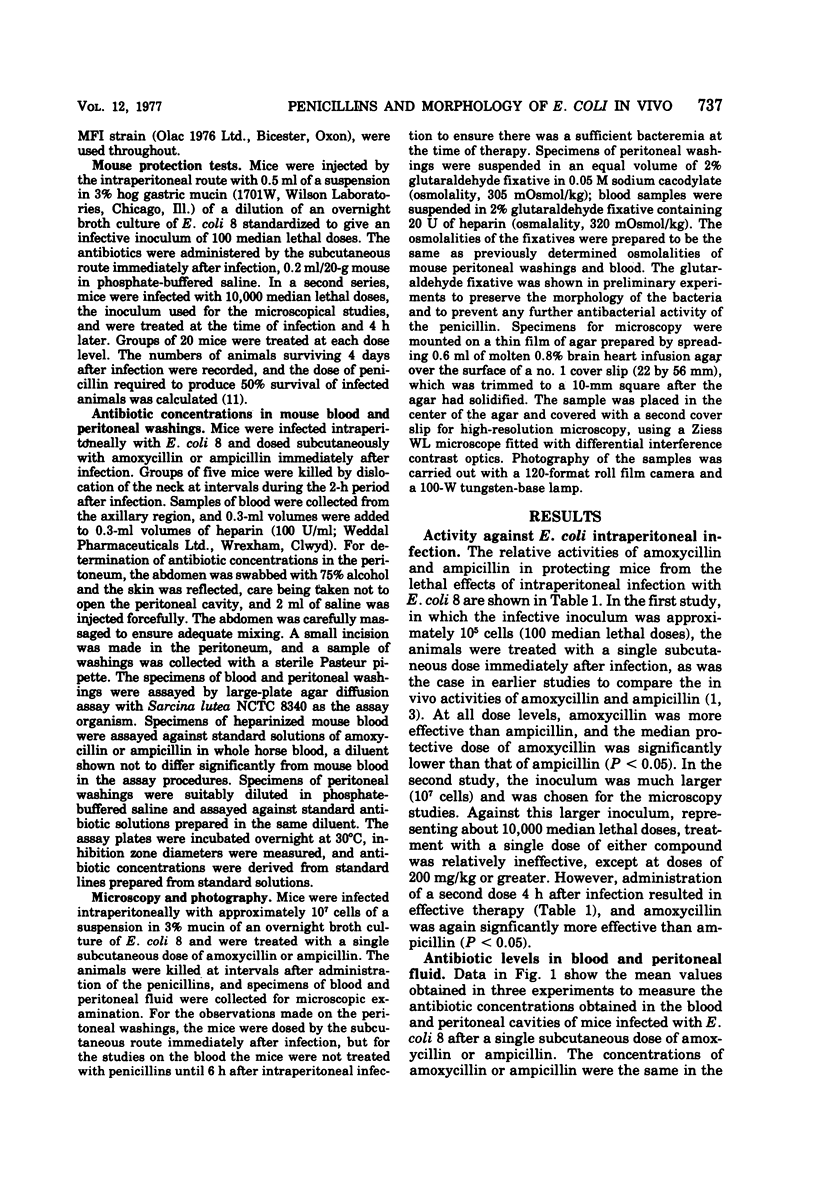

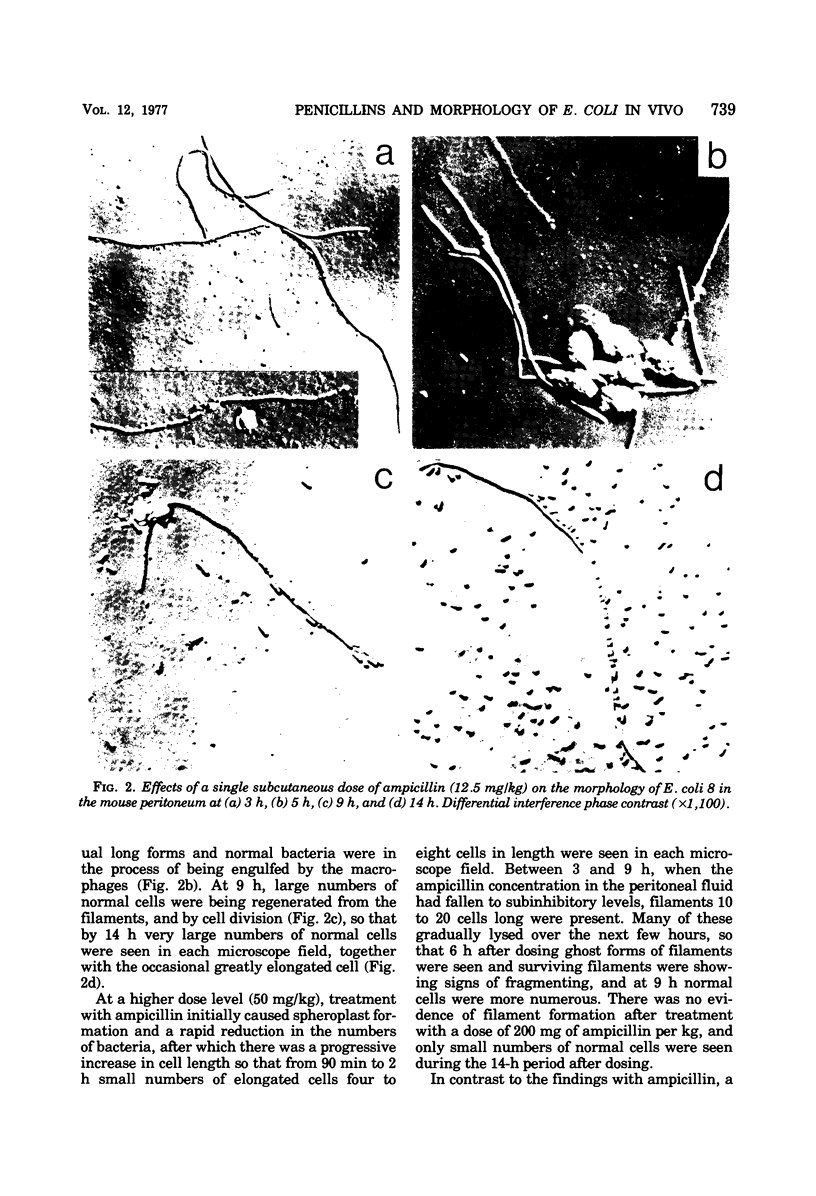
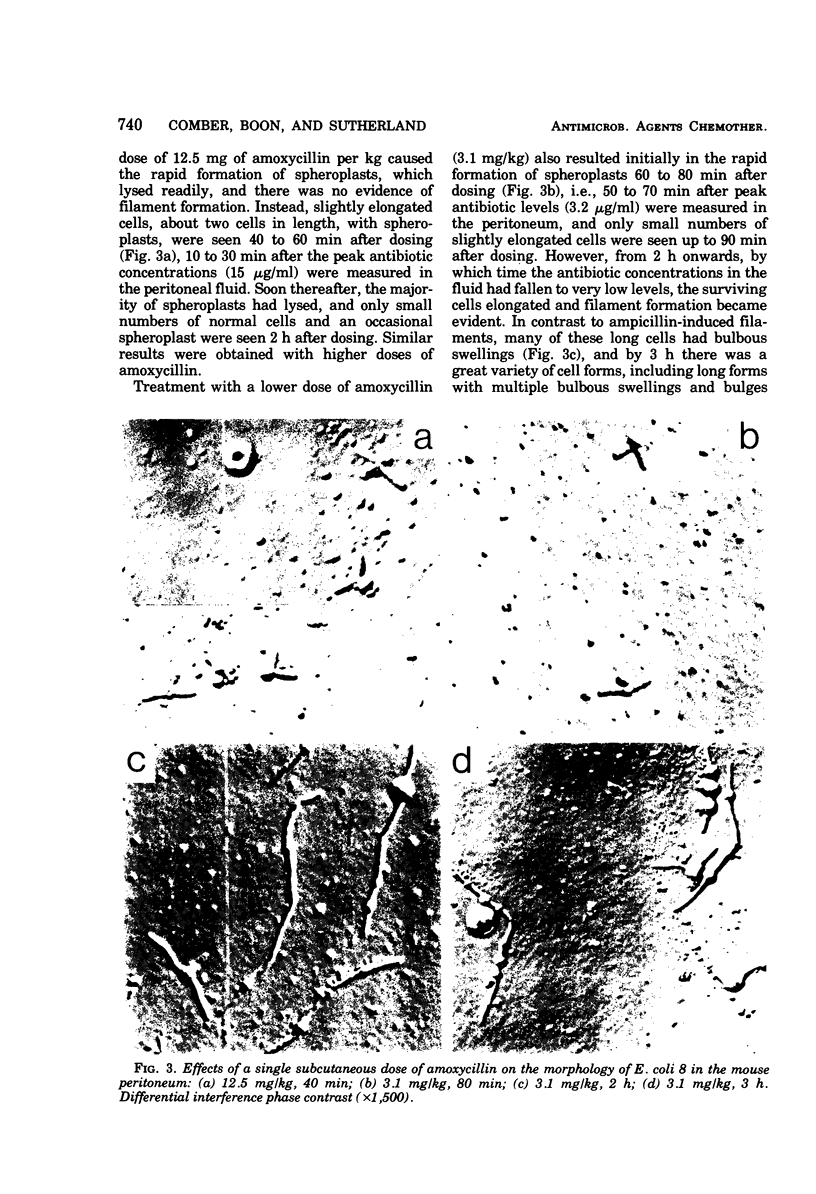
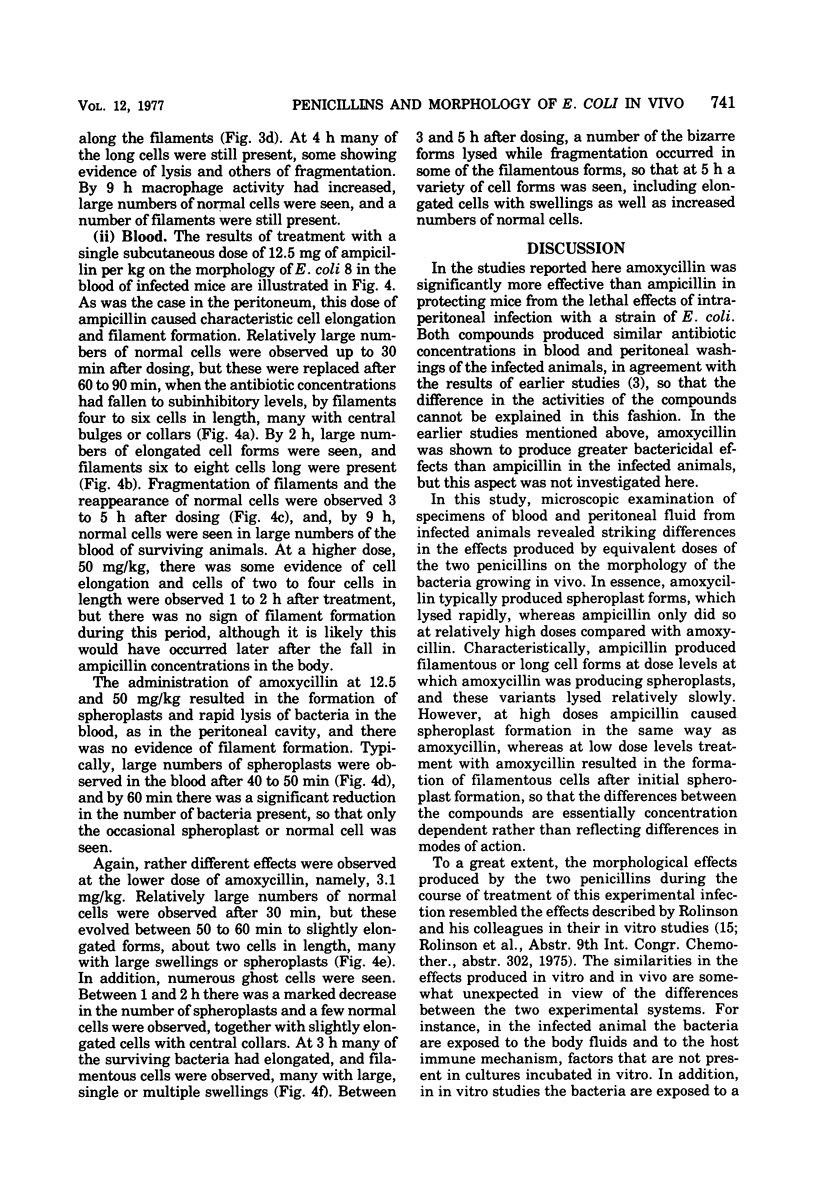


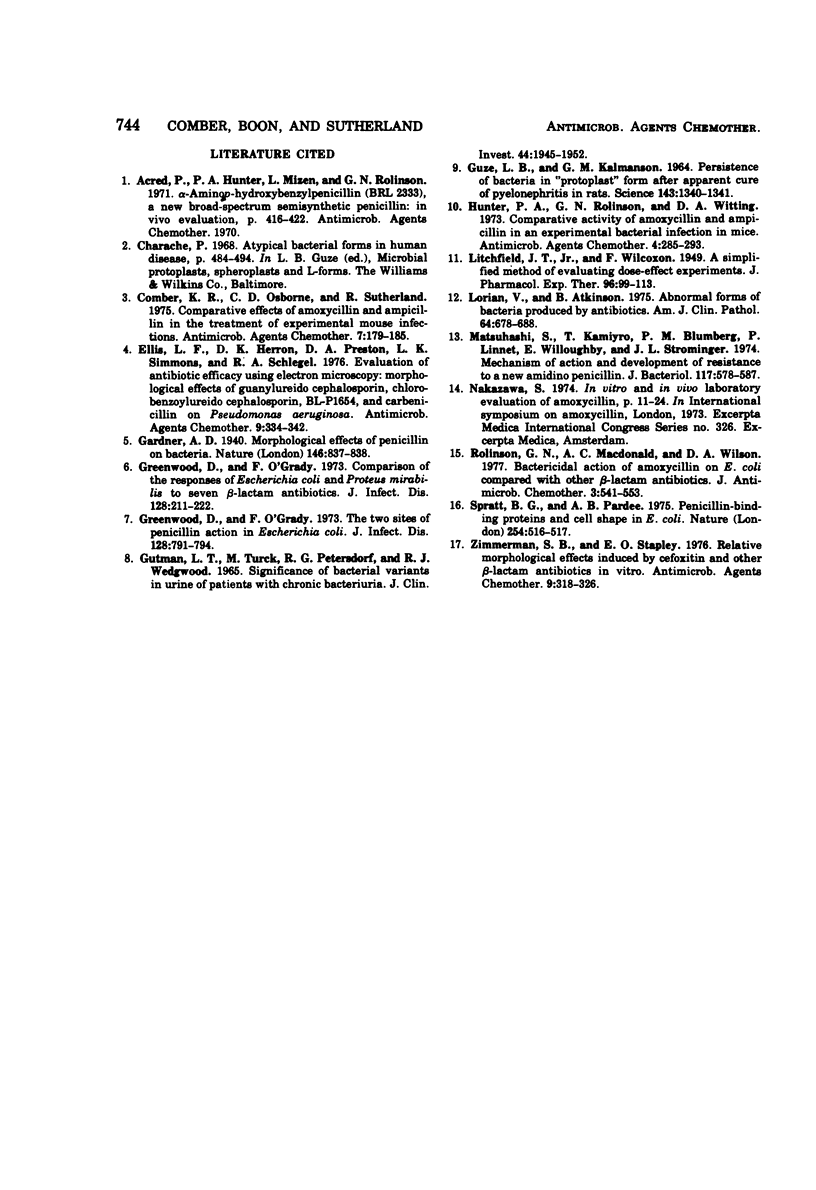
Images in this article
Selected References
These references are in PubMed. This may not be the complete list of references from this article.
- Comber K. R., Osborne C. D., Sutherland R. Comparative effects of amoxycillin and ampicillin in the treatment of experimental mouse infections. Antimicrob Agents Chemother. 1975 Feb;7(2):179–185. doi: 10.1128/aac.7.2.179. [DOI] [PMC free article] [PubMed] [Google Scholar]
- Ellis L. F., Herron D. K., Preston D. A., Simmons L. K., Schlegel R. A. Evaluation of antibiotic efficacy using electron microscopy: morphological effects of guanylureido cephalosporin, chlorobenzoylureido cephalosporin, BL-P1654, and carbenicillin on Pseudomonas aeruginosa. Antimicrob Agents Chemother. 1976 Feb;9(2):334–342. doi: 10.1128/aac.9.2.334. [DOI] [PMC free article] [PubMed] [Google Scholar]
- Greenwood D., O'Grady F. Comparison of the responses of Escherichia coli and proteus mirabilis to seven beta-lactam antibodies. J Infect Dis. 1973 Aug;128(2):211–222. doi: 10.1093/infdis/128.2.211. [DOI] [PubMed] [Google Scholar]
- Greenwood D., O'Grady F. The two sites of penicillin action in Escherichia coli. J Infect Dis. 1973 Dec;128(6):791–794. doi: 10.1093/infdis/128.6.791. [DOI] [PubMed] [Google Scholar]
- Gutman L. T., Turck M., Petersdorf R. G., Wedgwood R. J. Significance of bacterial variants in urine of patients with chronic bacteriuria. J Clin Invest. 1965 Dec;44(12):1945–1952. doi: 10.1172/JCI105300. [DOI] [PMC free article] [PubMed] [Google Scholar]
- Guze L. B., Kalmanson G. M. Persistence of Bacteria in "Protoplast" Form after Apparent Cure of Pyelonephritis in Rats. Science. 1964 Mar 20;143(3612):1340–1341. doi: 10.1126/science.143.3612.1340. [DOI] [PubMed] [Google Scholar]
- Hunter P. A., Rolinson G. N., Witting D. A. Comparative activity of amoxycillin and ampicillin in an experimental bacterial infection in mice. Antimicrob Agents Chemother. 1973 Sep;4(3):285–293. doi: 10.1128/aac.4.3.285. [DOI] [PMC free article] [PubMed] [Google Scholar]
- Lorian V., Atkinson B. Abnormal forms of bacteria produced by antibiotics. Am J Clin Pathol. 1975 Nov;64(5):678–688. doi: 10.1093/ajcp/64.5.678. [DOI] [PubMed] [Google Scholar]
- Matsuhashi S., Kamiryo T., Blumberg P. M., Linnett P., Willoughby E., Strominger J. L. Mechanism of action and development of resistance to a new amidino penicillin. J Bacteriol. 1974 Feb;117(2):578–587. doi: 10.1128/jb.117.2.578-587.1974. [DOI] [PMC free article] [PubMed] [Google Scholar]
- Rolinson G. N., Macdonald A. C., Wilson D. A. Bactericidal action of beta-lactam antibiotics on Escherichia coli with particular reference to ampicillin and amoxycillin. J Antimicrob Chemother. 1977 Nov;3(6):541–553. doi: 10.1093/jac/3.6.541. [DOI] [PubMed] [Google Scholar]
- Spratt B. G., Pardee A. B. Penicillin-binding proteins and cell shape in E. coli. Nature. 1975 Apr 10;254(5500):516–517. doi: 10.1038/254516a0. [DOI] [PubMed] [Google Scholar]
- Zimmerman S. B., Stapley E. O. Relative morphological effects induced by cefoxitin and other beta-lactam antibiotics in vitro. Antimicrob Agents Chemother. 1976 Feb;9(2):318–326. doi: 10.1128/aac.9.2.318. [DOI] [PMC free article] [PubMed] [Google Scholar]





